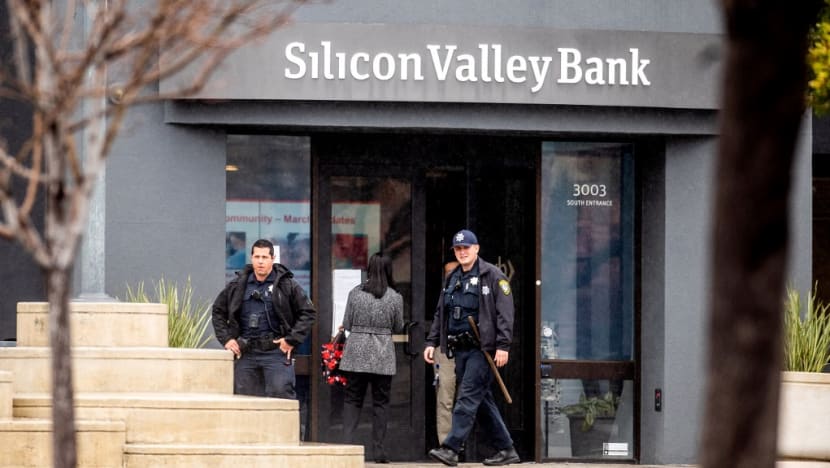
SANTA CLARA: United States regulators pulled the plug on Silicon Valley Bank (SVB) on Friday (Mar 10) in a spectacular move that sent global banking shares sputtering, as markets fretted over possible contagion from America's biggest banking failure since the 2008 financial crisis.
US authorities swooped in and seized the assets of SVB, a key lender to US tech start-ups since the 1980s, after a run on deposits made it no longer tenable for the medium-sized bank to stay afloat on its own.
Little known to the general public, SVB specialised in financing start-ups and had become the 16th largest US bank by assets. At the end of 2022, it had US$209 billion in assets and approximately US$175.4 billion in deposits.
Its demise represents not only the largest bank failure since Washington Mutual in 2008, but also the second-largest failure ever for a retail bank in the US.
In response to the sudden collapse, Treasury Secretary Janet Yellen convened an emergency meeting of top US banking regulators.
"Secretary Yellen expressed full confidence in banking regulators to take appropriate actions in response and noted that the banking system remains resilient and regulators have effective tools to address this type of event," a Treasury statement said.
CUSTOMERS STRANDED
Based in the shadow of the world's biggest tech companies, SVB's travails have raised fears that more banks may face doom as the fallout from high inflation and hiked interest rates squeezes weaker lenders.
In front of the SVB headquarters on a rainy day in Santa Clara, California, nervous customers spoke in small groups wondering how they could withdraw their money as news spread of the government seizure.
One customer dressed in a T-shirt and sweatpants, and who spoke on condition of anonymity, said he used the bank for payroll at his start-up.
"It's not a good situation. A lot of really top tier (venture capital firms) have very high amounts of exposure here," he said, adding that he was worried for his employees.
The bank's customers were met with locked doors on Friday. A client dashboard was down, a UK-based client of the bank told Reuters.
Dean Nelson, CEO of Cato Digital, was on a line outside of SVB Santa Clara headquarters, hoping to get answers. Nelson said he was worried about the company's ability to pay employees and cover expenses.
"Access to cash is the biggest problem for the majority of the companies here. If you’re a start-up, cash is king. The cash and the workflow, to be able to have the runway is critical."
The main office and all branches of Silicon Valley Bank will reopen on Mar 13 and all insured depositors will have full access to their insured deposits no later than Monday morning, the Federal Deposit Insurance Corporation (FDIC) said.
But 89 per cent of the bank's US$175 billion in deposits were uninsured as of the end of 2022, according to the FDIC, and their fate remains to be determined.
Companies such as video game maker Roblox Corp and streaming device maker Roku Inc said they had hundreds of millions of deposits at the bank. Roku said its deposits with SVB were largely uninsured, sending its shares down 10 per cent in extended trading.
Technology workers whose paychecks relied on the bank were also worried about getting their wages on Friday. An SVB branch in San Francisco showed a note taped to the door telling clients to call a toll-free telephone number.
The FDIC said it would seek to sell SVB's assets and that future dividend payments may be made to uninsured depositors.
At times in the past, the FDIC has moved quickly, even striking deals to sell major banks over the weekend.
SVB did not respond to calls for comment.
CRISIS MEASURE
The problems at SVB, which quickly escalated after the bank said on Wednesday it would raise money, underscore how a campaign by the Us Federal Reserve and other central banks to fight inflation by ending the era of cheap money is exposing vulnerabilities in the market.
The worries walloped the banking sector.
US banks have lost more than US$100 billion in stock market value over the past two days, with European banks losing around another US$50 billion in value, according to a Reuters calculation.
But on Wall Street on Friday, shares in heavyweights Bank of America, Wells Fargo and Citibank seesawed, with Yellen telling a congressional panel that she was "monitoring" a few banks.
This was swiftly followed by news that the California Department of Financial Protection and Innovation (DFPI) closed SVB and appointed the Washington-based Federal Deposit Insurance Corporation to take it over.
The crisis measure protects customers with up to US$250,000 in deposits and crucially buys time to find a potential buyer of whatever remains of the embattled Silicon Valley lender.
CNBC reported on Friday that SVB was in talks with potential buyers after attempts to ride out the crisis on its own failed.
"The debate today is whether SVB issues are SVB's issues or the start of a bigger issue for the banking sector," said a note from Patrick O'Hare of Briefing.com.
"There seems to be an allowance in the stock market for it being more of a company-specific problem or at least not a debilitating systemic issue."
Investors fear that other banks could face similar losses as they look to raise cash amid ever-rising interest rates with central banks moving aggressively to tame decades-high inflation.
"We'll have to see how this story develops but something always breaks hard during or after a Fed hiking cycle," Deutsche Bank analysts said in a note.
"Is this another mini wobble on this front or the start of something bigger? Tough to tell, but I would be stunned if there weren't many more casualties of this boom-and-bust cycle."
Some analysts forecast more pain for the sector as the episode spread concern about hidden risks in the banking sector and its vulnerability to the rising cost of money.
"There could be a bloodbath next week as banks are in trouble, the short sellers are out there and they are going to attack every single bank, especially the smaller ones," said Christopher Whalen, chairman of Whalen Global Advisors.
https://www.channelnewsasia.com/bus...d-states-banking-sector-fed-inflation-3339996



